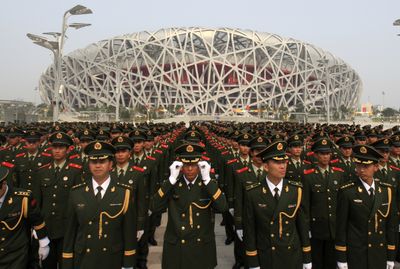China designating zones for protests at Olympics

BEIJING – In a nod to criticism that that it is stifling free speech during the Olympics, China intends to designate space in three public parks as “protest zones” for people to vent their grievances, officials said Wednesday.
Protesters will have to obtain permission from the Ministry of Public Security, disclosing the names of organizers, the topic and the number of participants.
“This is a practical step to bring China closer to international standards,” said Ni Jianping, deputy director of the Shanghai Institute for American Studies, who advised the Beijing Olympic committee on the concept. He said the idea also has been approved by the International Olympic Committee’s chief coordinator, Hein Verbruggen. “We are showing that Beijing is serious about human rights.”
The concept of a “protest zone” or “free speech zone” has been around since Seattle’s 1999 World Trade Organization meeting, which was disrupted by demonstrations. The special zones since have been used at many international gatherings, including the 2004 Summer Olympics in Athens, as well as at the Democratic and Republican conventions.
The protest zones are set for Ritan Park, World Park and Purple Bamboo Park, locations far enough from the main Olympic venues that spectators would be unlikely to see them. World Park also has been designated as a protest location for petitioners, ordinary citizens following a Chinese tradition who come to the capital to present personal grievances, according to Ni.
The Olympics are to open Aug. 8, and news of the protest zones came out Wednesday when Olympics security director Liu Shaowu disclosed the plan in response to a question at a news conference. He could not provide information about the procedures to apply for a demonstration permit.
“Chinese law guarantees the legal rights of demonstration and assembly,” Liu said. “To ensure smooth traffic flow, a beautiful environment and a sense of order near the sports venues, the demonstrations have to take place in parks.”
Human-rights advocates ridiculed the proposal as a “trap” to prevent the airing of substantial political grievances.
“Try demonstrating about Tibet, Taiwan, Tiananmen Square, and see what happens,” said Sharon Hom, the New York-based executive director of Human Rights in China.
Susan Brownell, a University of Missouri professor who worked on the proposal for protest zones, is hoping that the concept of a free speech zone – like the free trade zones that communist countries tried when moving toward market economies – could teach the Chinese government to tolerate more public criticism.
“We are hoping that it will serve as an experiment that will allow them to go forward.”